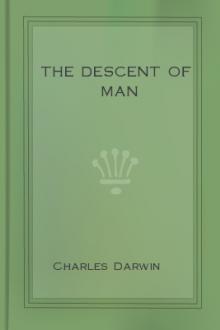The Shadow On The Dial, and Other Essays - Ambrose Bierce (latest ebook reader .TXT) 📗

- Author: Ambrose Bierce
Book online «The Shadow On The Dial, and Other Essays - Ambrose Bierce (latest ebook reader .TXT) 📗». Author Ambrose Bierce
Having observed with attention and considered with seriousness the London _Daily News_ declares its conviction that the dog, as we have the happiness to know him, is dreadfully bored by civilization. This is one of the gravest accusations that the friends of progress and light have been called out to meet--a challenge that it is impossible to ignore and unprofitable to evade; for the dog as we have the happiness to know him is the only dog that we have the happiness really to know. The wolf is hardly a dog within the meaning of the law, nor is the scalp-yielding coyote, whether he howls or merely sings and plays the piano; moreover, these are beyond the pale of civilization and outside the scope of our sympathies.
With the dog it is different His place is among us; he is with us and of us--a part of our life and love. If we are maintaining and promoting a condition of things that gives him "that tired feeling" it is befitting that we mend our ways lest, shaking the carpet dust from his feet and the tenderloin steaks from his teeth, he depart from our midst and connect himself with the enchanted life of the thrilling barbarian. We can not afford to lose him. The cynophobes may call him a "survival" and sneer at his exhausted mandate--albeit, as Darwin points out, they are indebted for their sneer to his own habit of uncovering his teeth to bite; they may seek to cast opprobrium upon the nature of our affection for him by pronouncing it hereditary--a bequest from our primitive ancestors, for whom he performed important service in other ways than depriving visitors of their tendons; but quite the same we should miss him at his meal time and in the (but for him) silent watches of the night. We should miss his bark and his bite, the feel of his forefeet upon our shirt-fronts, the frou-frou of his dusty sides against our nether habiliments. More than all, we should miss and mourn that visible yearning for chops and steaks, which he has persuaded us to accept as the lovelight of his eye and a tribute to our personal worth. We must keep the dog, and to that end find means to abate his weariness of us and our ways.
Doubtless much might be done to reclaim our dogs from their uncheerful state of mind by abstention from debate on imperialism; by excluding them from the churches, at least during the sermons; by keeping them off the streets and out of hearing when rites of prostration are in performance before visiting notables; by forbidding anyone to read aloud in their hearing the sensational articles in the newspapers, and by educating them to the belief that Labor and Capital are illusions. A limitation of the annual output of popular novels would undoubtedly reduce the dejection, which could be still further mitigated by abolition of the more successful magazines. If the dialect story or poem could be prohibited, under severe penalties, the sum of night-howling (erroneously attributed to lunar influence) would experience an audible decrement, which, also, would enable the fire department to augment its own uproar without reproach. There is, indeed, a considerable number of ways in which we might effect a double reform--promoting the advantage of Man, as well as medicating the mental fatigue of Dog. For another example, it would be "a boon and a blessing to man" if Society would put to death, or at least banish, the mill-man or manufacturer who persists in apprising the entire community many times a day by means of a steam whistle that it is time for his oppressed employees (every one of whom has a gold watch) to go to work or to leave off. Such things not only make a dog tired, they make a man mad. They answer with an accented affirmative Truthful James' plaintive inquiry,
"Is civilization a failure,
Or is the Caucasian played out?"
Unquestionably, from his advantageous point of view as a looker-on at the game, the dog is justified in the conviction that they are.
THE ANCESTRAL BOND
A WELL-KNOWN citizen of Ohio once discovered another man of the same name exactly resembling him, and writing a "hand" which, including the signature, he was unable to distinguish from his own. The two men were unable to discover any blood relationship between them. It is nevertheless almost absolutely certain that a relationship existed, though it may have been so remote a degree that the familiar term "forty-second cousin" would not have exaggerated the slenderness of the tie. The phenomena of heredity have been inattentively noted; its laws are imperfectly understood, even by Herbert Spencer and the prophets. My own small study in this amazing field convinces me that a man is the sum of his ancestors; that his character, moral and intellectual, is determined before his birth. His environment with all its varied suasions, its agencies of good and evil; breeding, training, interest, experience and the rest of it--have little to do with the matter and can not alter the sentence passed upon him at conception, compelling him to be what he is.
Man is the hither end of an immeasurable line extending back to the ultimate Adam--or, as we scientists prefer to name him, Protoplasmos. Man travels, not the mental road that he would, but the one that he must--is pushed this way and that by the resultant of all the forces behind him; for each member of the ancestral line, though dead, yet pusfaedi. In one of what Dr. Nolmes (Holmes, ed.) calls his "medicated novels," _The Guardian Angel_, this truth is most admirably and lucidly set forth with abundant instance and copious exposition. Upon another work of his, _Elsie Venner_--in which he erroneously affirms the influence of circumstance and environment--let us lay a charitable hand and fling it into the fire.
Clearly all one's ancestors have not equal power in shaping his character. Conceiving them, according to our figure, as arranged in line behind him and influential in the ratio of their individuality, we shall get the best notion of their method by supposing them to have taken their places in an order somewhat independent of chronology and a little different from their arrangement behind his brother. Immediately at his back, with a controlling hand (a trifle skinny) upon him, may stand his great-grandmother, while his father may be many removes arear. Or the place of power may be held by some fine old Asian gentleman who flourished before the confusion of tongues on the plain of Shinar; or by some cave-dweller who polished the bone of life in Mesopotamia and was perhaps a respectable and honest troglodyte.
Sometimes a whole platoon of ancestors appears to have been moved backward or forward, _en bloc_ not, we may be sure, capriciously, but in obedience to some law that we do not understand. I know a man to whose character not an ancestor since the seventeenth century has contributed an element. Intellectually he is a contemporary of John Dryden, whom naturally he reveres as the greatest of poets. I know another who has inherited his handwriting from his great-grandfather, although he has been trained to the Spencerian system and tried hard to acquire it. Furthermore, his handwriting follows the same order of progressive development as that of his greatgrandfather. At the age of twenty he wrote exactly as his ancestor did at the same age, and, although at forty-five his chirography is nothing like what it was even ten years ago, it is accurately like his great-grandfather's at forty-five. It was only five years ago that the discovery of some old letters showed him how his great-grandfather wrote, and accounted for the absolute dissimilarity of his own handwriting to that of any known member of his family.
To suppose that such individual traits as the configuration of the body, the color of the hair and eyes, the shape of hands and feet, the thousand-and-one subtle characteristics that make family resemblances are transmissible, and that the form, texture and capacities of the brain which fix the degree of natural intellect, are _not_ transmissible, is illogical and absurd. We see that certain actions, such as gestures, gait, and so forth, resulting from the most complex concurrences of brain, nerves and muscles, are hereditary. Is it reasonable to suppose that the brain alone of all the organs performs its work according to its own sweet will, free from congenital tendencies? Is it not a familiar fact that racial characteristics are persistent?--that one race is stupid and indocile, another quick and intelligent? Does not each generation of a race inherit the intellectual qualities of the preceding generation? How could this be true of generations and not of individuals?
As to stirpiculture, the intelligent and systematic breeding of men and women with a view to improvement of the species--it is a thing of the far future, It is hardly in sight. Yet, what splendid possibilities it carries! Two or three generations of as careful breeding as we bestow on horses, dogs and pigeons would do more good than all the penal, reformatory and educating agencies of the world accomplish in a thousand years. It is the one direction in which human effort to "elevate the race" can be assured of a definitive, speedy and adequate success. It is hardly better than nonsense to prate of any good coming to the race through (for example) medical science, which is mainly concerned in reversing the beneficent operation of natural laws and saving the unfittest to perpetuate their unfitness. Our entire system of charities is of, to the same objection; it cares for the incapables whom Nature is trying to "weed out," This not only debases the race physically, intellectually and morally, but constantly increases the rate of debasement. The proportion of criminals, paupers and the various kinds of "inmates" of charitable institutions augments its horrible percentage yearly. On the other hand, our wars destroy the capable; so thus we make inroads upon the vitality of the race from two directions. We preserve the feeble and extirpate the strong. He who, in view of this amazing folly can believe in a constant, even slow, progress of the human race toward perfection ought to be happy. He has a mind whose Olympian heights are inaccessible--the Titans of fact can never scale them to storm its ancient reign.
THE RIGHT TO WORK
ALL kinds of relief, charitable or other, doubtless tend to perpetuation of pauperism, inasmuch as paupers are thereby kept alive; and living paupers unquestionably propagate their unthrifty kind more abundantly than dead ones. It is not true, though, that relief interferes with Nature's beneficent law of the survival of the fittest, for the power to excite sympathy and obtain relief is a kind of fitness. I am still a devotee of the homely primitive doctrine that mischance, disability or even unthrift, is not a capital crime justly and profitably punishable by starvation. I still regard the Good Samaritan with a certain toleration and Jesus Christ's tenderness to the poor as something more than a policy of obstruction.
If no such thing as an almshouse, a hospital, an asylum or any one of the many public establishments for relief of the unfortunate were known the proposal to found one would indubitably evoke from thousands of throats notes of deprecation and predictions of disaster. It would be called Socialism of the radical and dangerous kind--of a kind to menace the stability of government and undermine the very foundations of organized society! Yet who is more truly unfortunate than an able-bodied man out of work through no





Comments (0)